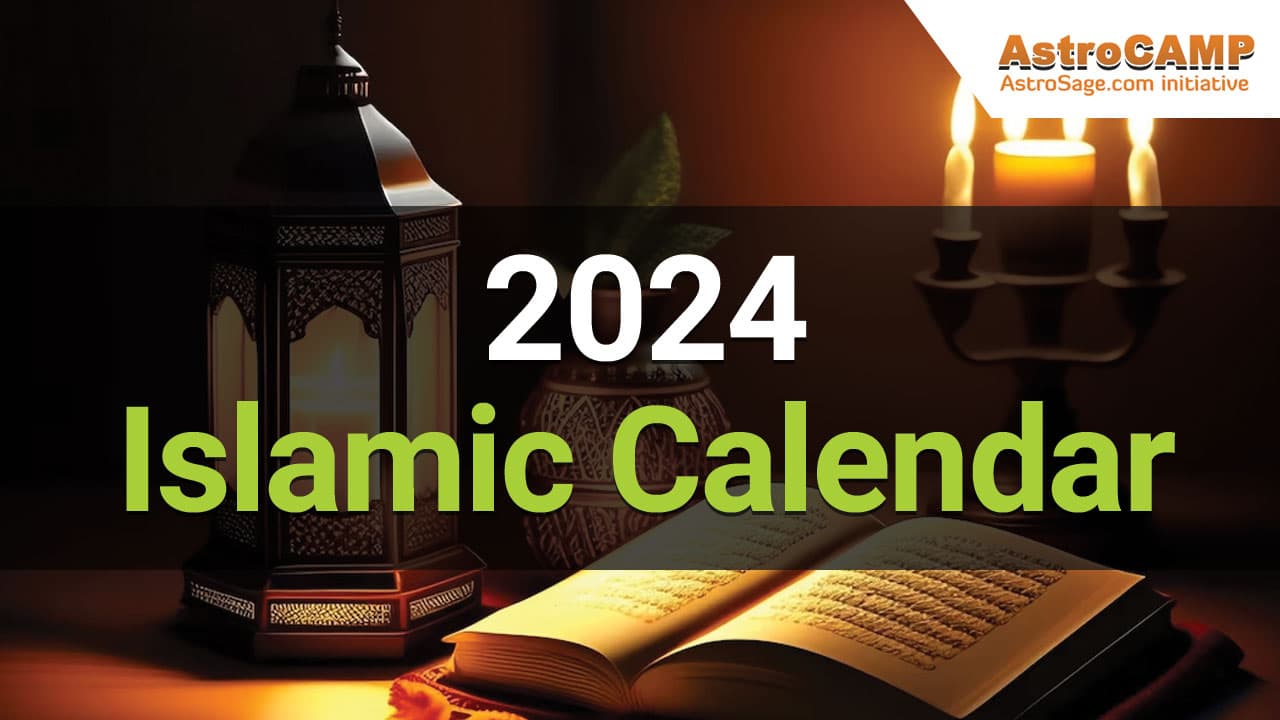Paid Services
2024 Islamic Calendar: Get the list of Islamic Holidays in 2024!
Author: Vijay Pathak | Last Updated: Wed 9 Aug 2023 2:39:00 PM
The 2024 Islamic Calendar is a divine tapestry woven with spiritual, cultural, and traditional threads. This sacred calendar, based on lunar cycles, gives Muslims a unique perspective on time, connecting them to millennia of rich history and profound religious observances. As the Islamic calendar shifts to 1446 AH (After Hijra), commemorating Prophet Muhammad's (peace be upon him) crucial migration from Mecca to Medina, a new chapter in the lives of Muslims worldwide begins.

The Islamic Calendar, known as the Hijri or Islamic lunar calendar, is extremely important to Muslims all around the world. This calendar, which is based on lunar cycles, not only organizes religious observances but also acts as a cultural and social framework. The Islamic calendar predicts a sequence of events in 2024 that will shape the spiritual landscape of the Muslim community. The Hijri, or Islamic Calendar, is extremely important in preserving Muslim culture. It's a must-have in every Muslim household, acting as a thorough guide to all the important dates that determine their religious and cultural practices.
यहाँ हिंदी में पढ़ें: इस्लामिक वार्षिक कैलेंडर 2024
For any type of astrological assistance- contact our experienced astrologers!
The 2024 Islamic Calendar holds the Hijri Calendar in high respect since it represents Islamic ideals through significant holidays and events. It is also known as the Muslim Calendar, Arabic Calendar, and Lunar Hijri Calendar, and it is based on the phases of the moon for the beginnings and endings of months. It covers 354-55 days instead of the traditional 365-66 days with 12 months like the Gregorian calendar. This calendar, which began after Prophet Mohammad's (PBUH) arrival to Madina, is credited to Khalifa Umar ibn al-Khattab.
Unlike other calendars that use leap years or months every 100 years to correspond with astronomical seasons, the 2024 Islamic Calendar does not use this method. An Islamic year is roughly 11 days shorter than 100 consecutive years, making it unsuitable for agricultural or practical purposes. As a result, several Muslim countries use the Gregorian calendar alongside the Hijri system for social and daily activities.
2024 Islamic Calendar: Names Of Islamic Months
- Muharram: The first month of the year
- Safar (Safar-Ul-Muzaffar): Muslims fled to Medina to escape the persecution of the Quraish.
- Rabi-Ul-Awal: The month of the Holy Prophet's birth, Hijrah, and demise
- Rabi-Ath-Thani: 4th month of the year (second spring)
- Jumada-Al-Ula: The month in which the Prophet married Sayyida Khadija (RA).
- Jumada-Al-Akhirah: It symbolizes the last month of dry weather.
- Rajab: This month, the prophet traveled to Isra-Miraj.
- Shaban: On the 15th of this month, Shab-e-barat (the Night of Forgiveness) takes place.
- Ramzan:This month symbolizes the start of the Holy Quran's revelation, as well as the month in which Muslims fast for 30 days.
- Shawwal: Eid-ul Fitr is observed on the first of the Shawwal month.
- Dhul-Qadah: Dhul-Qadah is of the 4 sacred months
- Dhul-Hijjah: The Hajj is performed throughout the month, and Eid-ul-Adha (Bakra-Eid) is observed on the 10th date of this month.
History And Significance Of 2024 Islamic Calendar
Around 637 CE, the second Caliph Umar accomplished something remarkable: he created the 2024 Islamic Calendar. But you may be wondering why he didn't just utilize the usual calendar. Because of an unprecedented event in 622 CE, the Prophet Muhammad (peace be upon him) relocated from Makkah to Madinah. This significant move was akin to a superhuman sacrifice to safeguard Islam. So Umar stated, "Hey, this should be the start of our calendar!" He said it purified the truth of lies, like a new beginning.
That particular year, the Hijri year, is now like a recall button for Muslims. It's a gentle nudge, reminding us of the sacrifices made by the earliest Muslims. They were pioneers, opening a path for Islam. It's like looking into a time machine when we use the Hijri Calendar. We reflect on the past, learn from it, and grow closer to God. It's more than just a list of dates; it's a treasure map that leads us to the heart of our religion. So, the next time you check the Hijri date, remember that you're touching a piece of history, a piece of sacrifice, and a whole lot of inspiration.
Get the Ultimate Compatibility Test with your partner here!!
2024 Islamic Calendar: Dates And Special Islamic Events
|
Festivals |
Hijri Date |
Gregorian Date/ Day |
|
Beginning of Jamada-ul-akhirah |
1 Rajab 1445 H |
13 January 2024 Saturday |
|
Isra Miraj |
27 Rajab 1445 H |
8 February 2024 Thursday |
|
Beginning of Shaban |
1 Shaban 1445 AH |
11 February 2024 Sunday |
|
Nisfu Shaban |
15 Shaban 1445 AH |
25 February 2024 Sunday |
|
Beginning of Ramadan |
1 Ramadan 1445 AH |
11 March 2024 Monday |
|
Beginning Of Roza in Ramadan (30 Days Fasts) |
1 Ramadan 1445 AH |
11 March 2024 Monday |
|
Nuzul-ul-Quran |
17 Ramadan 1444 AH |
8 April 2024 Saturday |
|
Lalyat-ul-Qadr |
27 Ramadan 1444 AH |
18 April 2024 Tuesday |
|
Beginning of Shawwal |
1 Shawwal 1444 AH |
21 April 2024 Friday |
|
Eid-ul-fitr |
1 Shawwal 1444 AH |
21 April 2024 Friday |
|
Beginning of sacred month, Dhul-Qadah |
1 Dhul-Qadah 1445 AH |
9 May 2024 Thursday |
|
Beginning of sacred month, Dhul-Hijjah |
1 Dhul-Hijjah 1445 AH |
7 June 2024 Friday |
|
Waqf In Arafat (Hajj) |
9 Dhul-Hijjah 1445 AH |
15 June 2024 Saturday |
|
Eid-ul-Azha |
10 Dhul-Hijjah 1445 AH |
16 June 2024 Sunday |
|
Days of Tashreeq |
11, 12, 13 Dhul-Hijjah 1445 AH |
17 June 2024 Monday |
|
Beginning of Muharram (Sacred months) |
1 Muharram 1446 AH |
7 July 2024 Sunday |
|
Islamic New Year |
1 Muharram 1446 AH |
7 July 2024 Sunday |
|
Ashura Fasts |
10 Muharram 1446 AH |
16 July 2024 Tuesday |
|
Beginning of Safar |
1 Safar 1446 AH |
5 August 2024 Monday |
|
Beginning of Rabi-Ul-Awal |
1 Rabi-Ul-Awal 1446 AH |
4 September 2024 Wednesday |
|
Prophet's Birthday |
12 Rabi-Ul-Awal 1446 AH |
15 September 2024 Sunday |
|
Beginning of Rabi-Ul-Thani |
1 Rabi-Ul-Thani 1446 AH |
04 October 2024 Friday |
|
Beginning of Jamada-ul-ula |
1 Jamada-ul-ula 1446 AH |
3 November 2024 Sunday |
|
Beginning of Jamada-ul-akhirah |
1 Jumada-al-akhirah 1446 AH |
2 December 2024 Monday |
2024 Islamic Calendar: List Of Islamic Days Of The Week
Something quite cool happens on Islamic weekdays: the day begins when the sky turns all colorful at dusk. Imagine the Muslim day begins as the sun begins to set and the stars begin to glimmer. But wait, there's more magic on Fridays! Muslims from all around the world rush to mosques to pray together. Now for the really intriguing part: the day officially begins what they call a "gathering day." That's like a lunar holiday. Because of this beautiful start to the day, Fridays and Saturdays, or Thursdays and Fridays, are the official weekend partners in many Muslim countries. The following are the days of the week in Islam.
- al-ʾAḥad: Sunday
- al-Ithnayn: Monday
- ath-Thulāthāʾ: Tuesday
- al-ʾArbiʿāʾ: Wednesday
- al-Khamīs: Thursday
- al-Jumʿah: Friday
- as-Sabt: Saturday
2024 Islamic Calendar: Major Holidays And Festivals In Islam
The following are some major festivals in Islam to be noted in 2024:
Shab-e-Barat (Night Of Forgiveness)
Shab-e-Barat, or the Night of Forgiveness, is very important in the Islamic calendar. On the 15th of Sha'ban, Muslims around the world gather to beg Allah's forgiveness for their mistakes. They also pray for deceased or sick family members on this night. It is believed that Allah sets future occurrences throughout this night.
As per the 2024 Islamic Calendar, diverse cultural customs inspire individuals from all over the world to celebrate this night in their own unique way. Across communities, the "Night of Atonement," or Shab-e-Barat, is known by numerous names such as Chiragh e Barat, Baraat Ki Raat, Beraat Kandili, and Nisfu Syaaban. This night is significant in the Islamic world. It's a chance to ask for forgiveness on behalf of ancestors and assure their salvation from hell.
To Know The Time Of Raj Yoga- Order Now: Raj Yoga Report
Ramadan (30 Days Of Fasting)
During the holy month of Ramadan, Muslims fast from sunrise to sunset in order to cleanse their souls and maintain ethical principles. This practice is a powerful tool for spiritual purification and self-discipline. The Qur'an, Islam's holy text, plays a major part in this practice. Muslims believe that the Prophet Muhammad received the Qur'an's revelations during the month of Ramadan. This supernatural message came through the angel Gabriel and has since become a cornerstone of the faith.
According to the 2024 Islamic Calendar, Muslims express their faith and a strong willingness to live lives of integrity and decency during this fasting season. They hope to create empathy for those less fortunate and improve their relationship to the divine by abstaining from indulgence during daylight hours. Ramadan, the ninth month of the Islamic calendar, not only deepens Muslim spiritual bonds but also reminds Muslims of the significance of compassion, humility, and dedication. Fasting becomes a collective declaration of their dedication and adherence to Islamic principles.
Jamat Ul Wida (Last Friday Of Ramadan)
Jamat Ul Wida is a wonderful Friday of Ramadan, filled with bounties and opportunities for salvation. Muslims mark this day by participating in a variety of spiritual and charitable activities that represent the core of their faith. On this day, believers seek solace and wisdom from the Quran's verses. Offering special prayers is a means for individuals to enhance their relationship with Allah and seek blessings for themselves and their loved ones.
As per the 2024 Islamic Calendar, the emphasis on social work and philanthropy is a distinguishing feature of Jamat Ul Wida. Muslims engage in acts of kindness and charity, helping the poor and needy. Activities such as feeding the less fortunate exhibit the spirit of compassion and giving, embodying Islamic principles. Gathering at mosques to give communal prayers fosters unity and shared dedication. These prayers include not just personal ambitions, but also desires for global peace, prosperity, and harmony. The congregation's earnest prayers express the hope for a world distinguished by understanding and goodwill.
Laylat al-Qadr (Night of Power)
According to the 2024 Islamic Calendar, Laylat al-Qadr, also known as the Night of Power, is a significant event that Muslims all around the world celebrate. It represents the night the first verses of the Quran were recited to Prophet Muhammad, commemorating the revelation of Islam's sacred scripture. Laylat al-Qadr translates to "Night of Power" in English, a phrase that captures the magnitude of this event. It is a period when Muslims pay respect to the heavenly moment when the Quran's revelations were revealed to Prophet Muhammad.
The holy Quran was gradually revealed to Prophet Muhammad on this auspicious night by the angel Gabriel. It is a crucial event in Islamic history, representing the birth of a faith and the spread of heavenly teachings. Laylat al-Qadr is a night of blessings, forgiveness, and divine benevolence. During this time, Muslims pray, reflect, and supplicate, seeking Allah's closeness and the fulfillment of their spiritual desires. By remembering Laylat al-Qadr, believers honor the transformative moment that influenced their faith and continue to gain inspiration from the Quran's teachings.
Eid-ul-Fitr (End Of Ramadan)
For Muslims, Eid ul-Fitr is a three-day festival that marks the end of Ramadan. This major occasion is distinguished by a number of customs that have special significance within the Islamic community. The passionate prayers delivered by Muslims on Eid ul-Fitr convey thankfulness for the spiritual progress and self-discipline achieved throughout the month of Ramadan. As believers get together to celebrate the end of this holy period, these prayers are a powerful expression of faith and unity.
As per the 2024 Islamic Calendar, Scrumptious snacks and foods are also an important element of the celebration, bringing a touch of indulgence to the festivities. The delicious dishes made for Eid ul-Fitr add to the festive ambiance, signifying the blessings and abundance that come with the end of Ramadan. Another exciting aspect of this event is the neighborhood gatherings and community festivities. Streets come alive with people greeting, socializing, and reveling in their shared enjoyment. These gatherings encapsulate the sense of connection and unity that is inherent in the Eid ul-Fitr values.
Get Customized and Accurate Shani Report according to your Kundli!
Eid-ul-Adha (Bakra Eid)
Eid-ul-Adha, also known as the Feast of Sacrifice, is celebrated on the tenth day of the Islamic lunar calendar's tenth month, Dhu-al-Hijjah. This momentous day follows the conclusion of the annual Hajj trip, with the celebration time dependent on the confirmed sighting of the moon. This lunar ritual reflects one of Islam's Five Pillars, a religious obligation for all Muslims. Eid-ul-Adha occurs in sync with the lunar calendar, coinciding with the completion of the Hajj pilgrimage. This pilgrimage to Mecca is a spiritual obligation for Muslims who meet certain requirements, and it culminates in the celebration of Eid-ul-Adha.
This three-day holiday starts on the third day of the Hajj pilgrimage. Its essence is to commemorate Abraham's tremendous readiness to sacrifice his son, a gesture that eventually led to his son's miraculous substitution with a lamb. During this time, Muslims perform the sacrificial act as a symbol of devotion. This sacrifice represents Abraham's unwavering faith and commitment. The common act of sacrifice resonates powerfully within the Islamic community, reinforcing their commitment to their faith's principles.
Ashura (10th Day Of Muharram)
According to the 2024 Islamic Calendar, in the Islamic world, Ashura is a mournful day of recollection with significant importance. This annual event takes place on the 10th of Muharram, the first month of the Islamic calendar. Ashura is a day of grief and meditation for Shia Muslims. The remembrance of Husayn ibn Ali's terrible death is a major component of Ashura's observance. This famous figure was killed at the Battle of Karbala in the year 680 CE. Shia Muslims, who mark Ashura as a day of mourning and memory, recognize his sacrifice and the sacrifices of his family members.
The historical events of Ashura have a special meaning for Hazrat Imam Hussain, Hazrat Muhammad's admired grandson. The events took place in the plains of Karbala, where Hazrat Imam Hussain and his family were mercilessly assassinated. The observance of Ashura serves as a solemn reminder of the tenacity, fortitude, and devotion exhibited by those who took part in this period in history. It is a moment for believers to reconnect with the teachings of their faith, reflect on the values of sacrifice and courage, and respect the legacy of Hazrat Imam Hussain and his companions.
Eid-Ul-Milad (Prophet Mohommad's Birthday And Death Ceremony)
As per 2024 Islamic Calendar, Eid-Ul-Milad, also known as the Prophet's Birthday and Death Ceremony, is a historic festival that honors Prophet Muhammad's birth and legacy. Sunnis observe the festival on the 12th of Rabi' ul-Awwal, while Shia celebrate it on the 17th of the same month in the Islamic calendar.
This event allows Muslims to dive into the life and teachings of the Prophet. Their insights are complemented by the recitation of unique prayers and hymns, building a strong spiritual connection. As a demonstration of their faith's emphasis on compassion, believers show their generosity by donating to people in need.
This is all you need to know about the 2024 Islamic Calendar. Wish you all a very happy new year and hope this article has benefited you in many ways!
- 2025 Horoscope
- 2025 राशिफल
- 2025 Chinese Horoscope
- 2025 चीनी राशिफल
- 2025 Muhurat
- 2025 मुहूर्त
- 2025 राशि भविष्य
- 2025 முகூர்த்தம்
- 2025 মুহূর্ত
- 2025 ముహూర్తం
- 2025 મુર્હત
- 2025 മുഹൂർത്തം
- 2025 ಮುಹೂರ್ತ
- 2025 মুহুৰ্ত
- 2025 ମୁହୂର୍ତ - ତିଥି ଓ ସମୟ
- 2025 ਮਹੂਰਤ
- 2025 ରାଶିଫଳ
- 2025 ਰਾਸ਼ੀਫਲ
- 2025 ರಾಶಿಭವಿಷ್ಯ
- 2025 രാശിഫലം
- 2025 રાશિફળ
- 2025 রাশিফল
- 2025 ராசி பலன்
- 2025 రాశిఫలాలు
 Best quality gemstones with assurance of AstroCAMP.com More
Best quality gemstones with assurance of AstroCAMP.com More
 Take advantage of Yantra with assurance of AstroCAMP.com More
Take advantage of Yantra with assurance of AstroCAMP.com More
 Yantra to pacify planets and have a happy life .. get from AstroCAMP.com More
Yantra to pacify planets and have a happy life .. get from AstroCAMP.com More
 Best quality Rudraksh with assurance of AstroCAMP.com More
Best quality Rudraksh with assurance of AstroCAMP.com More
Get your personalised horoscope based on your sign.



















